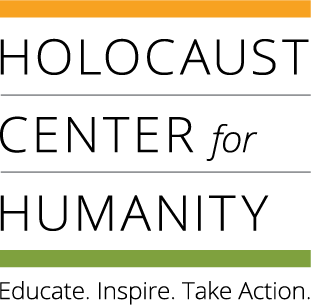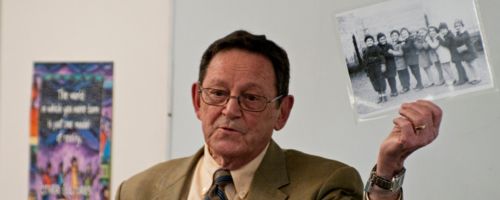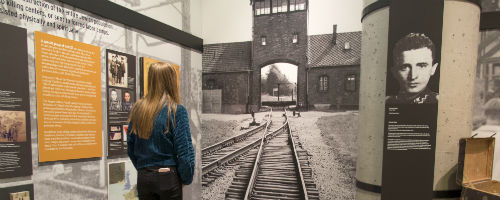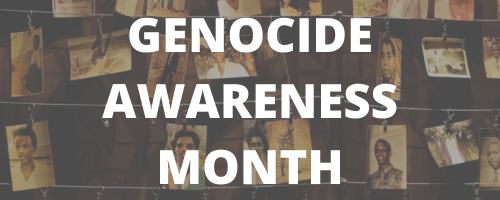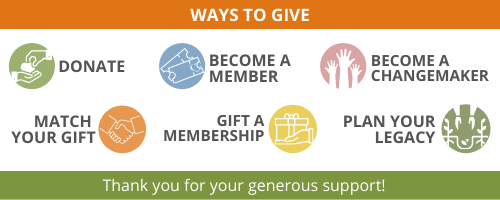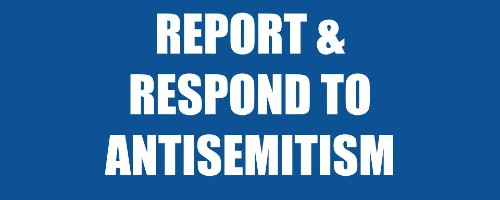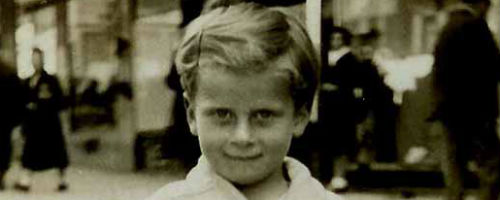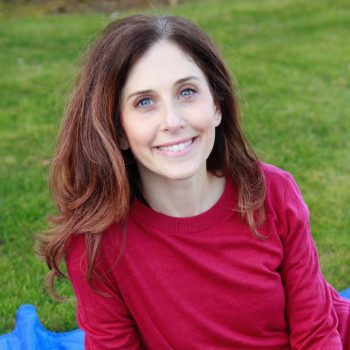
 Jessica Fenton grew up in South Florida very close to her grandparents, Natalie and Murray Borenstein. Jessica knew that her grandparents and their friends and neighbors were Holocaust survivors, which drove her to learn more and ensure their legacies lived on.
Jessica Fenton grew up in South Florida very close to her grandparents, Natalie and Murray Borenstein. Jessica knew that her grandparents and their friends and neighbors were Holocaust survivors, which drove her to learn more and ensure their legacies lived on.
Murray and Natalie were both Polish Jews. Natalie was born Naska Grunwald in Sosnowiec in 1918. Natalie and her sisters, all skilled seamstresses, sewed for Nazi wives while imprisoned in the Sosnowiec ghetto. Natalie then suffered terrible conditions in several forced labor camps of the Nazis, including a sub-camp of Auschwitz. Natalie was liberated at Ravensbruck concentration camp in 1945.
Murray (originally Motek) Borenstein was born in Lublin in 1919. He survived by escaping the Nazis en route to the Majdanek concentration camp, and subsequently taking on a non-Jewish Polish identity. With his new identity, Murray was able to work for German factories and businesses until the end of the war.
The two both managed to get to a Displaced Persons camp in Stuttgart, Germany in 1945. While there, Murray taught Hebrew, and Natalie was as a student. They met in class and fell in love. The couple married in 1946, and Jessica’s mother Esther was born in Germany in 1948. The family immigrated to New York in 1949, where they raised two more children and worked hard to create their new life. Later , the Borensteins retired to Florida.
As an adult, Jessica dug deeper to learn Natalie and Murray’s past. Jessica collected documents, video, and photos of her grandparents’ lives and shared them with the Holocaust Center for Humanity to create her presentation. She officially joined the Holocaust Center Speakers Bureau in 2020. Jessica and her husband live in Bellevue with their three sons.
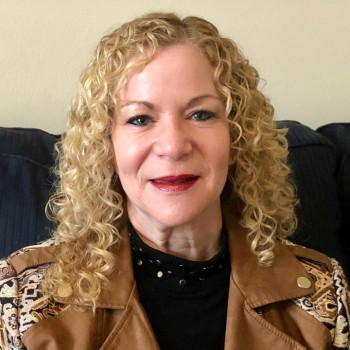
 Betsy Touriel-Kapner, the daughter of Austrian Holocaust survivors, tells the stories of her parents escape from Austria to Bolivia.
Betsy Touriel-Kapner, the daughter of Austrian Holocaust survivors, tells the stories of her parents escape from Austria to Bolivia.
Betsy Touriel-Kapner’s maternal grandparents, Gisela and Friedrich Aschkenasi, lived in Vienna, Austria, where they were married in 1924. Their daughter Gerda was born in 1932. In March 1938, the Nazis annexed Austria (an event termed “the Anschluss”) and soon enacted laws to strip Jews of their citizenship and careers. Jewish children, like Gerda, could no longer attend school. Betsy’s grandfather was sent to Dachau concentration camp, then Buchenwald, with other Austrian Jews who were prominent community members or businessmen. Gisela sold most of their belongings to bribe her husband out of Buchenwald.
The family of three managed to leave Austria by ship at the eve of World War II, traveling to Italy, then Chile, and overland to Bolivia with a visa from the Bolivian consulate. A German mining baron, Mauritz Hochschild, who operated tin mines in Bolivia, had convinced the Bolivian president to offer visas to Jews facing persecution in Austria and Germany. Some of these refugees, like Betsy’s grandparents, stayed in Bolivia permanently. Her grandfather became vice president of the mines run by Hochschild – who overall helped save nearly 20,000 Jews.
Betsy’s mother Gerda spent the rest of her childhood in Bolivia and attended high school and college there. Gerda travelled to Seattle to visit family in the 1950s, when she met a local man, Gabriel Touriel, who soon became her husband. They made their home in Tacoma, where Betsy and her brothers were born and raised.
After retiring from a career in the aerospace industry, Betsy felt a responsibility to share the story of her relatives and their unusual escape from Europe. Her grandparents and mother were refugees in South America, and her mother was later an immigrant to the United States. Their experiences of courage and rescue offer enduring lessons of resilience. Since 2020, Betsy has been a member of the Holocaust Center for Humanity Speakers Bureau, telling this family history to students and community members.
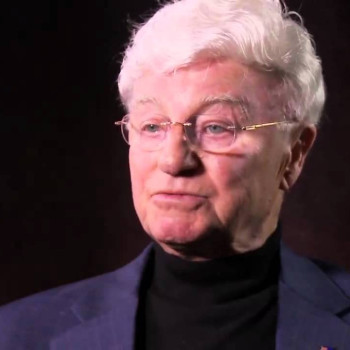
 Henry Friedman was born in 1928 to a Jewish family in Brody, Poland (present-day Ukraine). When the Nazis invaded Brody in 1941, they swiftly deprived Jews of their basic rights. One day in February 1942, a young woman named Julia Symchuck ran to the Friedman’s house and warned Henry's father that the Gestapo was coming for him. Thanks to Julia, Henry’s father was able to flee. In the fall of 1942, the Nazis forced the remaining Jews in the area into a ghetto in Brody. Henry, his mother, his younger brother, and their female teacher hid in a barn owned by Julia Symchuck's parents. The Friedmans remained in hiding for 18 months, freezing and slowly starving as food became scarce. Finally, in March 1944 they were liberated by the Russians. Julia Symchuck was later recognized as Righteous Among the Nations.
Henry Friedman was born in 1928 to a Jewish family in Brody, Poland (present-day Ukraine). When the Nazis invaded Brody in 1941, they swiftly deprived Jews of their basic rights. One day in February 1942, a young woman named Julia Symchuck ran to the Friedman’s house and warned Henry's father that the Gestapo was coming for him. Thanks to Julia, Henry’s father was able to flee. In the fall of 1942, the Nazis forced the remaining Jews in the area into a ghetto in Brody. Henry, his mother, his younger brother, and their female teacher hid in a barn owned by Julia Symchuck's parents. The Friedmans remained in hiding for 18 months, freezing and slowly starving as food became scarce. Finally, in March 1944 they were liberated by the Russians. Julia Symchuck was later recognized as Righteous Among the Nations.
Henry helped found the Holocaust Center for Humanity in 1989 and is an active member of the Speakers Bureau.
"When I was in hiding, I feared I would be the only Jew who survived. A terrible empty feeling came over me at the loss of so many cousins, and I felt as though I were standing all alone in a huge stadium." - Henry Friedman
Survivor Encyclopedia: Washington State - Henry Friedman. Read more about Henry, view photos, and watch video clips.
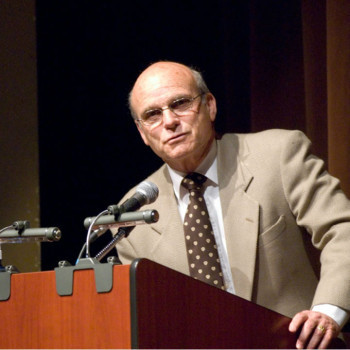
 Peter was born in Amsterdam in 1935. In 1942, when Peter was 7, the Nazis seized Peter's entire family except for Peter and his mother. Peter's mother contacted the Dutch Underground for help. The Underground found Klaas and Roefina Post who agreed to shelter Peter and his mother on their small farm in northern Holland, putting their own lives at risk. For two years they lived with the Posts until it became too dangerous and they found another hiding place with two women in The Hague. Peter, his mother, and his aunt were the only survivors of his family. Klaas and Roefina Post have been recognized as Righteous Among the Nations by Yad Vashem.
Peter was born in Amsterdam in 1935. In 1942, when Peter was 7, the Nazis seized Peter's entire family except for Peter and his mother. Peter's mother contacted the Dutch Underground for help. The Underground found Klaas and Roefina Post who agreed to shelter Peter and his mother on their small farm in northern Holland, putting their own lives at risk. For two years they lived with the Posts until it became too dangerous and they found another hiding place with two women in The Hague. Peter, his mother, and his aunt were the only survivors of his family. Klaas and Roefina Post have been recognized as Righteous Among the Nations by Yad Vashem.
After the war, Peter and his mother immigrated to the United States in 1949, arriving in New York. Peter was 13 and didn't speak any English, but was placed in the 8th grade. Peter had a long career as a radiology technologist. He and his wife Bea raised two children from Pete's previous marriage and had a third son in California. The Metzelaars moved to Seattle in 1997. Peter continues to be an active member of the Holocaust Center for Humanity's Speakers Bureau.
"My mother and I slept together in a bed that was inside a closet. I remember lying in that bed trembling in fear at times." - Peter Metzelaar
Survivor Encyclopedia: Washington State - Peter Metzelaar. Read more about Peter, view photos and watch video clips.
